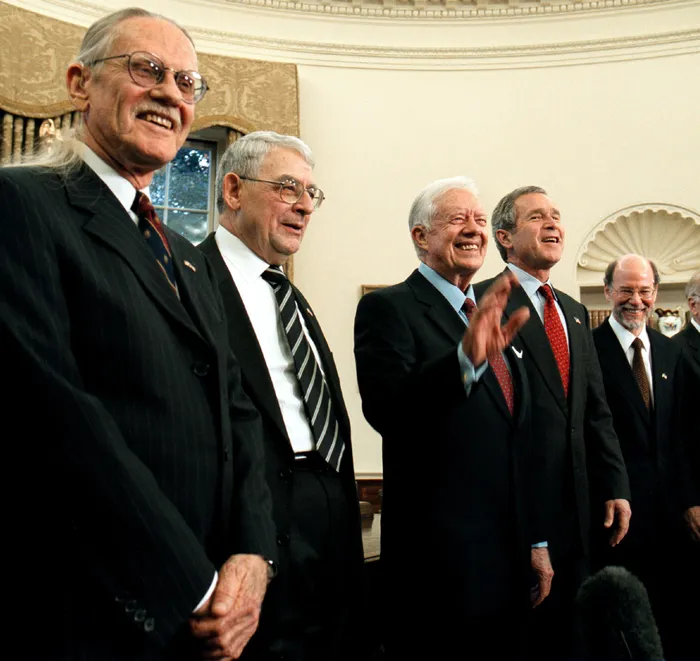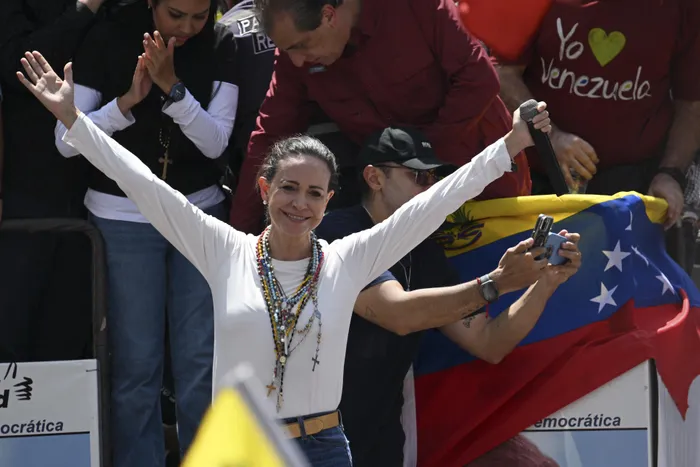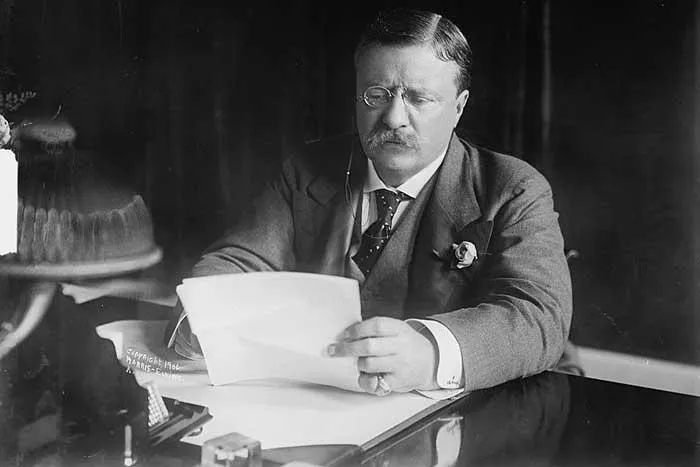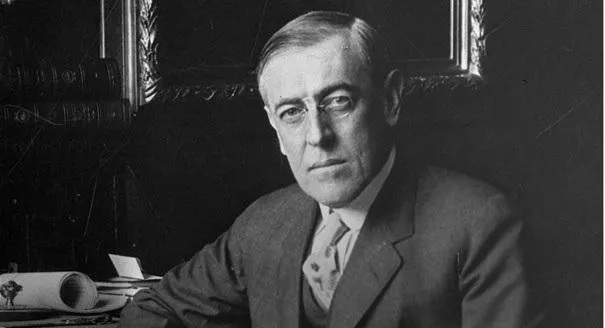For US presidents, Nobel Peace Prize long fraught with politics

Former president Jimmy Carter, recipient of the 2002 Nobel Peace Prize, waves during a reception in the Oval Office for that year's American Nobel laureates.
Image: Rich Lipski/The Washington Post
Karen Tumulty
Maybe next year.
It was perhaps not a coincidence that the announcement Friday of the 2025 Nobel Peace Prize for which President Donald Trump has so openly campaigned coincided with his greatest foreign policy triumph to date - a widely praised ceasefire and hostage deal that, though still fragile, could be the beginning of the end of two years of war between Israel and Hamas in Gaza.
But it also came as Trump has sent troops into U.S. cities over the objections of those who govern them, has goaded his compliant attorney general to prosecute his political enemies, and in other ways wielded executive power in a heavy-handed manner unlike any in modern U.S. history.
So it could be read as a rebuke to Trump that the prize committee in Oslo awarded the honor to Venezuelan opposition leader María Corina Machado, who has led a movement against the authoritarian regime of Nicolás Maduro. She has been living in hiding since last year, when the presidential candidate she backed lost what was widely regarded as a rigged election.
Machado was lauded by the committee as “a woman who keeps the flame of democracy burning amid a growing darkness.” Her admirers and supporters include Secretary of State Marco Rubio, who wrote earlier this year in Time magazine that she is “the personification of resilience, tenacity, and patriotism.”
She, meanwhile, has praised Trump’s “courageous” and “visionary” policies toward her country, which recently have included attacking boats in the Caribbean that Trump has said were carrying drug smugglers.

Venezuela opposition leader Maria Corina Machado won the 2025 Nobel Peace Prize.
Image: FEDERICO PARRA / AFP
However deep their mutual admiration, Machado’s pick brought sour grapes from the Trump White House. Communications Director Steven Cheung issued a statement that the “Nobel Committee proved they place politics over peace.”
If that was indeed the case, it wouldn’t be the first time. The awarding of the Nobel Peace Prize, especially where U.S. presidents are concerned, has long been used to send a message as well as bestow an honor. The choice has also reflected the passions of the moment, which don’t always age so well.
In 2009, Barack Obama won it only months into his presidency, but the prize - which cited his “vision” and “extraordinary efforts” - was more a mark of aspiration than achievement by the first Black president in U.S. history.
Near the end of his second term, late-night host Stephen Colbert asked Obama what he had actually done at that point to earn it, and the president deadpanned: “To be honest, I still don’t know.”
Three other of Trump’s predecessors have also received the Peace Prize, though not without controversy.

Theodore Roosevelt at his desk, 1906.
Image: Library of Congress
Theodore Roosevelt was the first American to be awarded the medal, in 1906, for his mediation of the Russo-Japanese War peace settlement. It is on the wall of the Roosevelt Room of the White House, along with the Medal of Honor that he received posthumously in 2001 for his heroism in the Spanish-American War.
“At the time of his award in 1906-1907, TR was the most admired statesman in the world,” his late biographer Edmund Morris once told me in an email.
But when Roosevelt received his Nobel, the choice also raised some eyebrows, given his well-earned reputation for militarism. “The prize will, we trust, modify his own conventional ideas about the necessity of being armed to the teeth,” the Nation magazine wrote.
Roosevelt’s loathed rival Woodrow Wilson won the peace prize in 1919, for being the chief architect of the League of Nations, even as the United States itself was refusing to join what turned out to be a short-lived and ineffective organization aimed at assuring peace after World War I.

Woodrow Wilson received the award for his efforts to end WWI.
Image: File
Jimmy Carter, the other president to receive the Peace Prize, was decades out of office by the time he won in 2002. “When I got the call this morning at 4am, I thought it was a joke,'' Carter said. “I didn’t even know this was the day the prize was announced. I usually follow these things, but this year I wasn’t paying attention.”
Carter’s unexpected honor was an all-but-explicit dig at President George W Bush during the buildup to the Iraq War. Gunnar Berge, the Nobel committee chairman, even acknowledged it “should be interpreted as a criticism of the line that the current administration has taken.''
When it comes to Nobel Peace Prize disappointments, Trump has some company in Bill Clinton. The 42nd US president had substantial foreign policy achievements, including helping to broker peace in Northern Ireland and the Balkans. Clinton was nominated and passed over so many times by the Nobel committee that Slate dubbed him the “Susan Lucci of the Nobel Peace Prize,” after the soap opera actress known for her many daytime Emmy disappointments. (Though unlike Clinton, Lucci finally won.)
On the other hand, Clinton’s vice president, Al Gore, fell barely short in his own 2000 quest for the White House, but managed to pull off what was perhaps the most decorated second act in history.
Gore shared the Peace Prize in 2007 for his environmental work. That same year saw him onstage at the Academy Awards picking up a best documentary Oscar for “An Inconvenient Truth,” and winning a prime time Emmy for his cable network, Current TV. In 2009, Gore added a Grammy to his collection of accolades, for the audiobook version of “An Inconvenient Truth.”
Still, there has never been anything quite like Trump’s public campaign for the Peace Prize - or his obsession with it. “If I were named Obama, I would have had the Nobel Prize given to me in 10 seconds,” he said when he was running last year to return to the White House. And then earlier this year in the Oval Office: “They will never give me a Nobel Peace Prize. It’s too bad. I deserve it, but they will never give it to me.”
No doubt this will not be the last we’ve heard from Trump about it. And depending on how things go in the Middle East, he might actually have a shot at it in 2026.